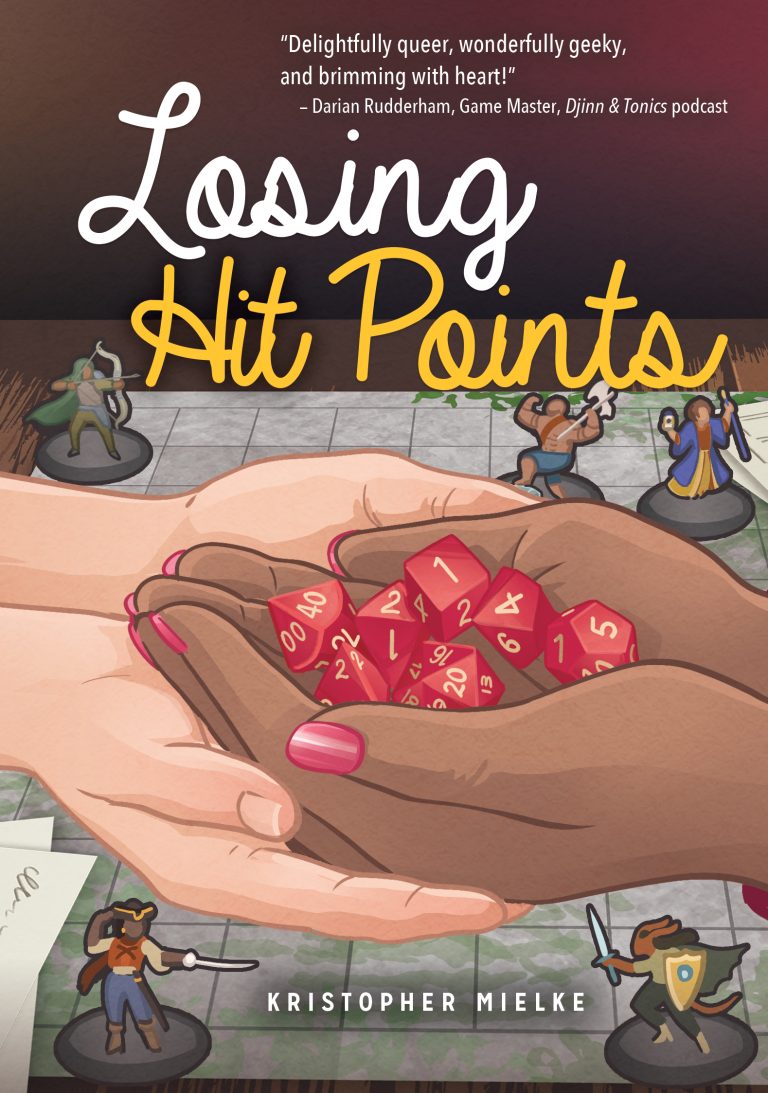Losing Hit Points

Losing Hit Points
“I’m really glad we came tonight,” Rumour says.
Heat creeps over my cheeks. “Yeah? I, uh, I told Hamish he’d do great.”
“He is. And even though we kinda almost ruined it, Ian’s having more fun than he has in ages. School hasn’t been easy lately. You know how it can be for queer kids.”
Ian and Hamish are both at the counter. Hamish is treating Ian to a second milkshake, with Rumour’s permission. I can hear them talking about the unfair cancellation of The Owl House from here.
“Is he out?” I ask.
Rumour nods. “We talked about how it might be hard at first. How the world isn’t always safe for us. And it doesn’t look like it’s getting safer any time soon. But there’s so much joy in being true to yourself. It doesn’t make the bad stuff go away, but it also brings so much good into your life. Real friends who love you for you. Relationships where you don’t need to lie about who you are.”
“Relationships,” I repeat. Don’t say it, don’t say it, don’t-- “Are you, um, are you in a ...?”
No Charisma roll could save someone so hopeless. Even Nathan glances over his shoulder at me and clears his throat before moving to the counter. But Rumour doesn’t call me out. She only shakes her head, her ponytail swinging.
A game of Dungeons & Dragons creates the backdrop for Losing Hit Points, a relatively short read about friendships and being true to yourself. Journey, working at a game and comic shop called Limited Series, never expects their ex-best friend to walk into the public D&D session. Journey and Rumour used to be close until Journey pushed her away when she needed them the most. Now, Journey has to face their past decisions and unpack their real feelings towards Rumour.
Through the different rolls and moves of the D&D campaign, Journey slowly uncovers the truth between how their friendship with Rumour dissolved: Rumour began to transition into a girl when Journey was deeply conflicted about their own gender identity. Instead of supporting Rumour, Journey pushed her away, and the two had not spoken since. Journey, desperate to reconnect with Rumour through their fated D&D campaign, attempts to use their character to patch things up between the two. As the campaign progresses and things get more awkward for a myriad of reasons, an eventual break from the game allows Rumour and Journey to talk. As it turns out, Rumour wasn’t the only one hurt by Journey’s abandonment, and Journey realizes there is more than one apology to make. There are multiple turning points for multiple characters, and the novel ends with warmth and hope for everyone involved in the D&D campaign.
The strength of Losing Hit Points is in its character reflections and celebration of queer joy. Journey is a flawed character who admits their flaws and becomes better because of it while allowing the reader to better understand one person’s exploration of their gender identity. The host of side characters are all wonderful additions to the plot and bring their own essences and unique personalities, and, while it can be slightly confusing to keep track of the human characters and their D&D personas, the narrative falls into a gentle rhythm of moving back and forth between D&D and the comic shop, all while adventuring through relationship tension and goblin nests.
Readers of Losing Hit Points do not need an extensive background of Dungeons & Dragons to understand the plot, but I did find that having basic knowledge of the role-playing game helped my overall understanding of the swaps between D&D storytelling and the “real life” storylines. The pacing was perhaps slower than one might anticipate for a book of this nature, and it was the connections to the characters that kept me reading. The end of the novel includes campaign notes and D&D character write-ups which are a creative addition to the story. Losing Hit Points is a fun read with important conversations about identity and acceptance.
Lindsey Baird is a high school English teacher on Treaty 7 Territory in Southern Alberta.
